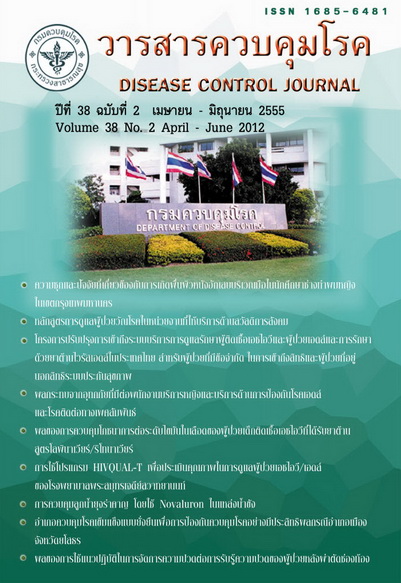Flooding Impact on Female Sex Workers and HIV and STI Prevention Services
Keywords:
Flooding impact, Female sex workers, HIV and STI preventionAbstract
Thailand faced with serious flood in many provinces during September 2011-December 2011. Bureau of AIDS, TB and STIs conducted a study to assess impact from flood among female sex workers (FSWs) and HIV and STI prevention services in order to use the results for developing a guideline to prepare comprehensive prevention services for the floods that may happen again in the future. Design of the study was cross sectional. Data were collected in 5 flooded-provinces, namely Nakorn Sawan, Lopburi, Ayutthaya, Nonthaburi and Bangkok, during December 2011-January 2012 which was around a month after flood. In order to gather qualitative data, focus group discussion was conducted among FSWs, and in-depth interview was applied among STI service providers and HIV counselors and NGO representatives. Samples were selected purposively. Data were analyzed using a content analysis method. Thirty-nine FSWs attended focus group discussions. Eleven health providers and 6 NGO representatives were interviewed. Impact from flood included closing of several sex establishments. Most of those continued open sex establishments report to have declined number of clients due to inconvenient travelling. However, sex establishments located in non¬flood area reported increasing number of clients. It is noted that, during flood period, some SWs moved to other provinces or new establishments and some direct SWs transformed to work as freelance. Most of SWs answered that they had sufficient condoms and used condoms regularly. Some NGOs couldn't run their activities. One condom inventory of public health service was damaged. STI clinics were still capable to provide service in all provinces but number of clients was remarkably reduced. There was a report of increased gonorrhea incidence after flood in one province. In flooding situation, there is still a need to support condoms for SW in all sex establishments which can carry on their service, both in areas with and without flood. To effectively enhance HIV and STI prevention, condom should be made widely available and accessible to the public. In addition, mobile STI clinic service or referral system of patient may be necessary in areas with inconvenient transportation.
Downloads
References
2. สำนักโรคเอดส์ วัณโรค และโรคติดต่อทางเพศสัมพันธ์ กรมควบคุมโรค. แนวปฏิบัติสำหรับหน่วยบริการสุขภาพในการติดตาม และดูแลรักษาผู้ติดเชื้อเอชไอวีที่ได้รับผลกระทบจากสถานการณ์อุทกภัยปี 2554. กรุงเทพมหานคร: บริษัทเรดิเอชั่น จำกัด, 2555.
3. Yang Dingdu. NGOs rescue flood victims with HIV in Thailand, http://news.xinhuanet.com/english2010/indepth/ 2011 - 11/30/c_131279350.htm. เข้าดูเมื่อวันที่ 3 เมษายน 2555.
4. Inter-Agency Standing Committee. Guidelines for HIV/AIDS interventions in emergency settings. http: / / www. humanitarianinfo. org / iasc. เข้าดูเมื่อวันที่ 5 ธันวาคม 2554.
5. IRIN. NAMIBIA: Floods interrupted AIDS services-report. http://www.plusnews.org/repoit/ 8518 5 /NAMIBIA- Floods - interrupted- AIDS - Services-report. เข้าดูเมื่อวันที่ 3 เมษายน 2555.
6. Oxfam. Ready or Not: Pakistan's resilience to disasters one year on from the floods, http://www.oxfam.org.nz/ resources/onlinereports/ bpl50-ready-not-pakistan-resilience-disas-ters-floods-260711-en.pdf. เข้าดูเมื่อวันที่ 3 เมษายน 2555.
7. อารีย์ พรหมโม้, ดุสิตา พึ่งสำราญ, สุรางค์ จันทร์แย้ม. เซ็กซ์กับสุขภาพทางเพศในพนักงานบริการหญิง. ใน: มิติ "เพศ" ในประชากรและสังคม. กรุงเทพมหานคร: บริษัทเอดิสัน เพรส โพรดักส์ จำกัด, มิถุนายน 2551.
8. International Organization for Migration. Improving HIV preparedness and response in emergencies. http://nairobi.iom.int/news/item/down- Ioad/121_c361526c3 83b9ccb7fd27a20f5 a03f96. เข้าดูเมื่อวันที่ 3 เมษายน 2555.
Downloads
Published
How to Cite
Issue
Section
License
Articles published in the Disease Control Journal are considered as academic work, research or analysis of the personal opinion of the authors, not the opinion of the Thailand Department of Disease Control or editorial team. The authors must be responsible for their articles.






